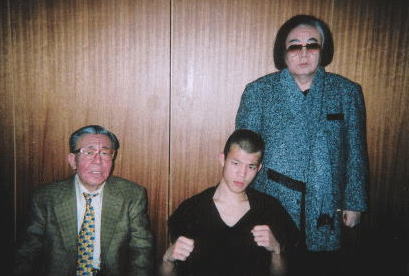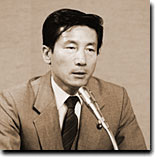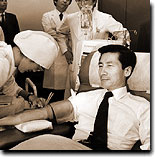
For some reason, foreign financial reporters on Japan seem to have the best perspective. Here are two examples:
William Pesek, a columnist for Bloomberg, earned my admiration back in June when he cut through layers of government spin to find the real reason why BOJ Governor Toshihiko Fukui should resign:
The scandal involving his 10 million yen ($86,950) investment in a fund led by a shareholder activist jailed on insider-trading charges has gone beyond theater and farce. It now threatens to tarnish Japan’s global reputation.
Even if it turns out Fukui didn’t break any laws, his actions were dumb. Fukui invested in Yoshiaki Murakami’s fund in 1999, when he was at the Fujitsu Research Institute. He applied in February to sell his shares, raising questions of propriety as the BOJ prepares to boost rates for the first time since August 2000 and after his investment more than doubled in value.
The bigger problem is how vehemently Prime Minister Junichiro Koizumi has come to Fukui’s defense. It means the BOJ governor, who is supposed to be independent, now owes the prime minister. The upshot is that a rate hike that was widely expected in July may be delayed until after Koizumi steps down in September.
Fukui, 70, yesterday said “monetary policy isn’t affected by politics” and that the BOJ needs to adjust rates “without delay.” Even so, the mere perception that BOJ policies are paralyzed thanks to Fukui’s missteps is reason enough for him to resign.
Preach it!
Coming in at No. 2 (only because he doesn’t cover issues I’m curious about often enough) we have David Piling, the FT‘s correspondent in Tokyo. Like Pesek, he’s adept at cutting through the BS, even when it comes from his fellow Britons as in this book review:
To wish [the “unique” aspects of Japan] away would be to miss something recognisably Japanese. Yet, to treat Japan as inherently odd can quickly stray into stereotype, even prejudice. Just as bad, it can bolster the case of those Japanese exceptionalists who assert that Japan is unique, superior and unknowable by foreigners.
…
In Atomic Sushi, May seeks to break the deadlock by recounting, wittily and often brilliantly, his personal experiences, greedily amassed during a year spent teaching at the University of Tokyo.
…
The approach, as befits a professor, is to tell a story (often hilariously) and then to offer analysis. The interpretations are sometimes amusing and astute, but sometimes they are so sweeping as to be virtually meaningless. Take the account of a beautiful girl who, though standing, falls asleep virtually draped over a commuting businessman. Apparently in the depths of slumber, she nevertheless awakens the instant the train reaches her destination.
She apparently displays the Japanese people’s “pervasive and acute alertness to their environment and its subtle signals, instilled perhaps by their constant vulnerability to earthquakes”. Or maybe she just heard the station announcement.
As a reporter, Piling will undoubtedly be replaced when his time comes to be promoted or the FT feels that his closeness to Japan could pose a conflict of interest problem (one major reason why many news companies replace their foreign correspondents so often). I can only hope that they find someone with as keen judgment.
There are many who feel that Japan shouldn’t have to put up with foreign criticism, or that Japan’s image needs to be mollycoddled by official propaganda and numerous underdisclosed shills. But I can’t stress it enough that open debate and frank discussion (most especially when it’s available for free on the Internet), such as the above examples, are desirable when you’re talking about understanding another society, discussing policy choices in a society in which you’re invested, in monetary terms or otherwise. It results in a better informed public and a broader range of ideas from which to draw inspiration and guidance.





